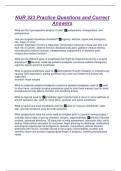NUR 323 Practice Questions and Correct
Answers
What are the 3 perioperative phases of care? ✅preoperative, intraoperative, and
postoperative
How are surgical procedures classified? ✅urgency: elective, urgent and emergency
risk: major or minor
purpose: diagnostic (confirm a diagnosis), preventative (removal of body part that is at
high risk of cancer), ablative (remove diseased body part), palliative (reduce illness),
reconstructive (restore function), transplantation (replacement of diseased part),
constructive (restore function)
What are the different types of anesthesia that might be experienced during a surgical
procedure? ✅General, moderate sedation/analgesia (conscious sedation/analgesia),
regional, topical and local anesthesia
What is general anesthesia used for ✅administered through inhalation or intravenously
causing CNS depression, putting someone fully under and needs their airway fully
supported
example: major surgery
What is moderate sedation/analgesia (conscious sedation/analgesia) used for ✅used
for short term, minimally invasive procedures used for short term memory loss for small
procedures but their able to maintain own breathing airway
What is regional used for ✅anesthetic agent injected near a nerve or nerve pathway or
around operative site, used for nerve block, epidural, and spinal anesthesia
What is topical and local anesthesia used for ✅used on mucous membranes, open
skin, wounds and burns used for tooth extraction
What assessments does the nurse need to complete prior to a person having surgery?
(includes items listed on pre-op checklist, consent, responsibilities) ✅witness informed
consent, advanced directives, 30 days prior nursing assessment, admission data, verify
testing, initiat patient education for outcomes, begin planning for discharge, medications
and surgical experiences (anticoagulants, diuretics, tranquilizers, adrenal steriods,
antibiotics with mycin), consider hazard of the surgery (comorbidities (number and
severity) nature and duration (type/purpose/length of surgery)), meeting physcological
needs
, What are the different types of postoperative complications immediately and within 24-
48 hours? ✅Immediate: shock, pain, cardiovascular (DVT, blood pooling in veins,
hemorrhage) and respiratory (supporting own airway)
24-48 hours: infection, DVT, pain, fluid and nutrition imbalance, elimination,
What nursing actions should be implemented to prevent the occurence of post-operative
complications? (interventions/actions are also inclusive of patient teaching) ✅educate
patient on the outcomes to expects, what exercises will be taking place after surgery,
ensure safety percautions, administer prescribed pre medications such as antibiotics
and anticoagulants, monitor assessment finding before and after surgery, make sure
discharge planning is planned
If the postoperative complications were to occur what assessment findings would the
nurse detect? ✅Hemorrhage and shock: fluid imbalance, decreased output,
hypotension, weak thready rapid pulse, anxious, cold, dehydrated, clammy skin,
hyperventilation
DVT: pain in leg, edema/swelling, redness, hottness
If the postoperative complications were to occur what actions should the nurese take or
how should the nurse respond? ✅hemorrhage- replace blood loss and stop the
bleeding
shock- increase tissue perfusion by stopping cause of shock
DVT break the clot before reaching heart
What preoperative assessment information do you need to prepare the older adult for a
surgical experience? ✅You need to consider the hazards of surgery: number and the
severity of comorbidities (other diseases) and the nature (type/purpose) and duration
(length of time) of the surgical procedures
How do the physiologic changes of aging pose risks to the older adult during the intra
and postoperative phases of the surgical experience? ✅cardiac reserves are lower
renal and hepatic functions are depressed
gastrointestinal activity is reduced
respiratory conpromise
decreased subcutaneous fat more susceptible to temperature changes
may need more time and multiple education formats to understand and retain
information
What nursing care activities are performed pre and postoperative (includes assessment,
nursing care activities which includes patient teaching)? ✅vital signs and assesment
patient teaching for what interventions will be taking place after the surgery
nutrition/fluids/labs
skin/wound/surgical sights assessments
input/output
nausea/vomiting (gastrointestinal status)




